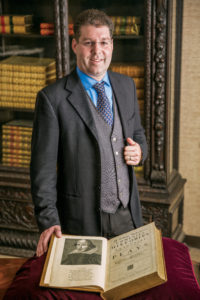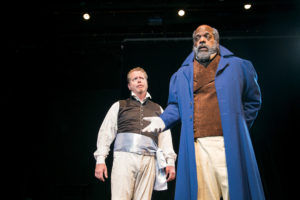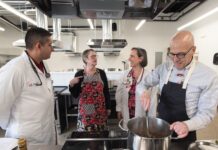This year marks the 400th anniversary of William Shakespeare’s death. To commemorate the life, works and times of the world’s best-known bard, the University of Louisville partnered with the Louisville Free Public Library and the Frazier History Museum for an eight-month-long, citywide celebration called Will in the Ville. The event culminates with the arrival of Shakespeare’s First Folio, the first collected edition of his plays, which will be on display at The Frazier History Museum.
Bringing Shakespeare’s First Folio to Louisville is a major cultural and literary achievement for the city. UofL Professor Andrew Rabin worked with his counterparts at the Louisville Free Public Library and the Frazier History Museum to make this historic event happen. It was a labor of love that took collaboration, dedication, and perspiration.
“We’ve spent the last two years setting up programming, arranging the exhibition and generally preparing for what will be one of the largest community collaborations in city history,” Rabin said.
The First Folio
When Shakespeare died in 1616, it was not the conventional practice to collect the complete works of an author. However, such was Shakespeare’s prominence and popularity that two of his fellow actors, John Heminge and Henry Cordell, decided to publish his plays in collected form. They did so not only to preserve Shakespeare’s plays, but also to ensure that they would be performed respectfully and appropriately for generations to come.
The First Folio was published seven years after Shakespeare’s death. The large and impressive 900-page book contained 36 of Shakespeare’s plays, 18 of which had never been printed before. It is this fact that makes the First Folio so important. Without the First Folio, some of Shakespeare’s most famous plays, including “Twelfth Night,” “Measure for Measure,” “Macbeth,” “Julius Caesar” and “The Tempest,” might never have survived. Without it, we may never have gained such a complete insight into Shakespeare’s storytelling genius or experienced his mastery of language, character and human emotions.
Words and wisdom
In 2014, the Folger Shakespeare Library in Washington, D.C., announced a competition to send one authentic First Folio to one site in each of the 50 states. “It turned into a tremendous national competition,” Rabin said. “Here in Kentucky, we decided to submit a joint proposal between three organizations. Ours was selected, which was tremendously exciting.”
The Folger Library’s “First Folio! The Book That Gave Us Shakespeare” exhibition will be housed at the Frazier History Museum from November 10 to December 10. The event is free to the public and also features three other rare folios: Shakespeare’s 1685 Fourth Folio, Ben Johnson’s 1616 First Folio and Beaumont and Fletcher’s 1647 Folio, which are on loan from the UofL Archives and Special Collections department.
The First Folio exhibition is important not only because of the literary significance of the exhibits, but also because it allows the community to see, first hand, the magnificence of Shakespeare’s writing. When Shakespeare wrote, he expressed in a uniquely beautiful way what it is to be human. He used, and often created, words and phrases that captured our innermost thoughts, highest ideals and deepest emotions; and he did so in a manner that could be understood by everyone.
This universal appeal is as strong today as it was 400 years ago. Shakespeare still talks to us and continues to give us the language of love, conflict, pain and compassion. Shakespeare’s relevance in the modern world is something that Rabin hopes visitors will take away from the exhibition.

“The language we use now to talk about ourselves, our place in society, what it means to be citizens of the world, in many ways that language came from Shakespeare. And so for people to come to see the First Folio — to participate in the First Folio events — it’s a wonderful chance to be reminded, in some sense, of how we became who we are and how Shakespeare’s use of language shaped that.” Rabin said.
Will in the Ville
The Will in the Ville celebration is packed with fun, informative and entertaining events. The eight-month-long program brings together more than 45 arts, cultural and educational organizations throughout Louisville and Southern Indiana and aims to make Louisville a “City of Shakespeare.”
As one of the organizers, Rabin sees Will in the Ville as a testament to Louisville’s ongoing commitment to arts and culture.
“Arts and culture are tremendously important to our city’s identity. This is yet another way to bring all of these organizations together around a single project,” he said.
Frazier History Museum’s Jodi Lewis has also been impressed by the willingness and enthusiasm of organizations across the region to get involved. “It isn’t just the number of organizations who have lined up behind this project that delights me, but the diversity of community partners who have embraced our Will in the Ville programming initiative,” Lewis said. “It has been a wonderful experience to work with such eagerly collaborative and supportive colleagues.”
From the university’s perspective, Rabin sees the event as an opportunity for UofL to use its unique position to enrich the lives of everyone in the community. “UofL is tremendously excited to be organizing the Will in the Ville project. In some sense, this is what a university is supposed to do. We carry out our research and teaching within the walls of the university, but then we use our research and we use our classes to bring wonderful things like the First Folio out into the community,” he said.
Will in the Ville has something for everyone, from the avid Shakespearean scholar to the budding poet, actor or writer. And for the creatively inclined, there’s even a Renaissance print workshop, where you can print your very own First Folio page. Some of the world’s most renowned Shakespearean authorities will be giving lectures, including this year’s ACC distinguished lecturer, Peter Holland, PhD, from the University of Notre Dame, and the award-winning Shakespearean expert and author, James Shapiro, PhD, from Columbia University.

Sonnets on a Sunday adds a modern twist to Shakespeare, with UofL English Department students writing their own sonnets in response to Shakespeare’s, which will be performed by student actors from the Commonwealth Theatre. UofL’s Theatre Arts Department will be putting on a production of the ever-popular “King Lear,” which will run most of November. And, if you like music, don’t miss “Music of Shakespeare’s London,” by UofL’s Early Music Ensemble, which will feature songs, dances, viole da gamba, recorders, harpsichord and more. Full details of all the exciting and entertaining Will in the Ville events can be found online.
As Louisville embraces Will in the Ville in 2016, one has to wonder what Shakespeare would have made of our beautiful and vibrant River City. We can only guess at his response, but we can hope it would have been this line from his play, “As You Like It:”
“I like this place and willingly could waste my time in it.”



























